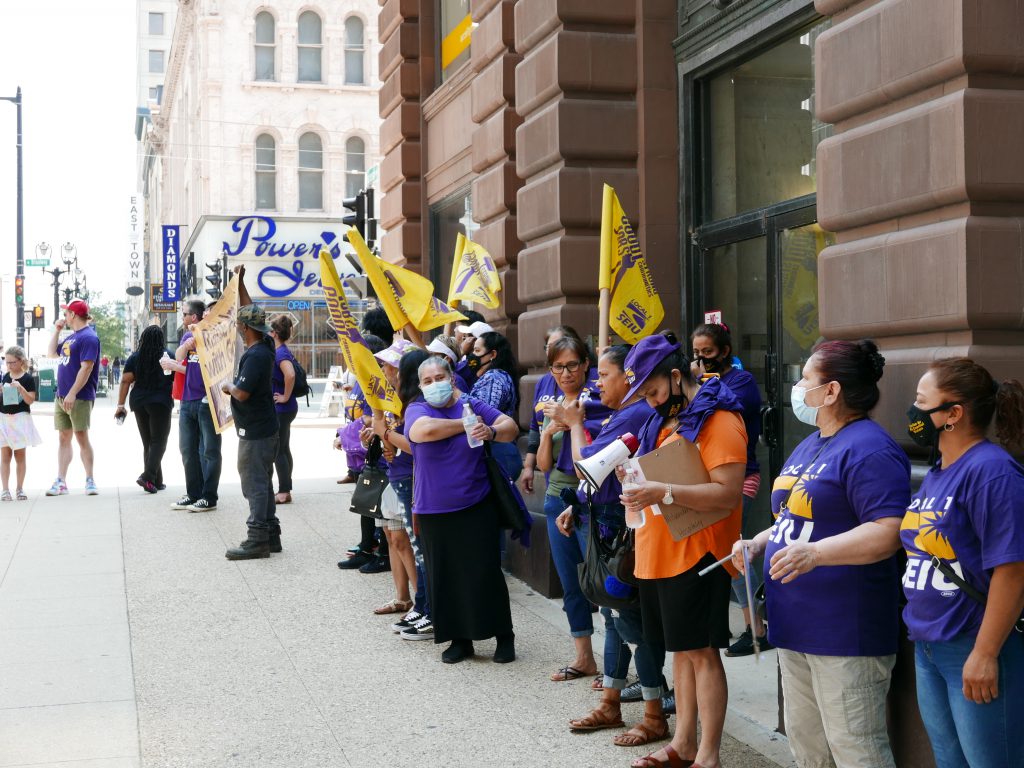Janitors Union Gains $15 Minimum Wage
New wage floor as of 2022. Union also secured wider-ranging labor power in the cleaning industry.

SEIU Local 1 janitors rally Downtown for $15 an hour. Photo by Graham Kilmer.
The union representing the janitors and cleaners working in commercial office buildings in downtown Milwaukee have secured a new three-year contract with a coterie of cleaning companies.
The cleaners, represented by the SEIU Local 1, work for approximately a dozen different companies, but they have bargained together as a single organization for years. Which workers are covered by the union contract has always been defined geographically, and it is mostly confined to Downtown.
James Rudd, a union steward and cleaner, said the union secured a $15 wage floor for all employees covered by the contract, beginning in the second year of the contract.
This was Rudd’s first time on the bargaining committee, having only recently been elected steward by his co-workers. “It was one of the best experiences I’ve ever been through,” he said.
Rudd said the union successfully negotiated for something that, as a Black man, “touches my soul a bit.” That was getting Juneteenth to become a paid holiday. They also secured protection for their immigrant co-workers, should they experience difficulties with the country’s byzantine immigration system. “We were able to secure their job for a certain amount of time, just in case they need to secure proper certification or there’s an issue with Social Security, or an event that’s out of their control.”
Janitors and cleaners should be treated as professionals who do more than clean the toilets, Rudd said. They’re skilled workers, he said, who are often the mediators between building owners and tenants. Many janitors and cleaners view their jobs as a profession, and they deserve to be treated as such, he said.
Under this contract, if 50% of a cleaning company’s employees in a market outside of downtown Milwaukee — but within metro Milwaukee — become unionized, it triggers a contractual provision that results in 100% of the company’s employees in that market being covered by the union contract.
Peter Rickman, president of the Milwaukee Area Service and Hospitality Workers Organization (MASH), told Urban Milwaukee in July that a major goal of the contract was “about lifting up a model for how to achieve what we call sectoral bargaining or industrial bargaining. Everybody in the industry sits at the table together to figure out what the common standards are.”
MASH and SEIU 1 have worked together on the janitors’ contracts since 2018. Rickman said they are “sister unions” that have partnered to build “a long term strategy for the same group of workers.”
That strategy is on display in the SEIU’s latest agreement with the cleaning services. The “charter” is a mechanism that will bring new workers under the protection of the union contract, and move closer to the goal of sectoral bargaining, wherein every player in the industry would sit down to bargain for a single set of rules in a labor contract.
Labor law in the U.S. is based upon “enterprise bargaining” in which labor agreements are negotiated between the employees and the bosses of a single organization.
“Enterprise is a path to death,” for service industry labor organizing, Rickman said.
Firms will have to compete on productivity, efficiency and marketing, not on who pays their employees less, or denies them affordable healthcare, he said.
For the contractors that are not yet union, Rickman said, “You need to go union, or else we’re going to replace you with a union contractor.” As the sectoral power of the janitors and cleaners increases, union plans include “going up the chain of capital” to building owners and players in the real estate industry who can “tell their contractors to be union or replace them with a union contractor,” Rickman said.
With this latest janitor’s contract, Rudd said, “We all agreed that we want the union areas to remain union. We are not for non-union companies coming in and taking over buildings.”
If you think stories like this are important, become a member of Urban Milwaukee and help support real, independent journalism. Plus you get some cool added benefits.






















I worry that the trickle-up effect of this wage may cause entry-level employers to leave the area.
My hat is off to Mr. Rickman and the union members for improving the lives of working people. Congratulations!
Hahaha that was funny